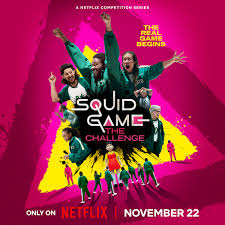The Squid Game The Challenge, takes the iconic elements of the hit Netflix series “Squid Game” and transforms them into a real-life competition, blending the thrilling essence of the show with reality television. This ambitious project has garnered significant attention, allowing fans of the original series to engage with its themes in a new and immersive way. In this article, we explore the concept behind “Squid Game: The Challenge,” its format, and the implications of turning fiction into a reality-based competition.
Concept and Development
Inspired by the globally successful series “Squid Game,” which captivated audiences with its blend of suspense, drama, and social commentary, “Squid Game: The Challenge” aims to replicate the high-stakes atmosphere of the fictional games. The series presents real contestants who compete in various challenges inspired by the show, with a significant cash prize awaiting the winner.
The development of the challenge series was announced by Netflix as part of its strategy to expand its content offerings, creating new opportunities for viewer engagement and interaction. The project promised to maintain the spirit of the original while ensuring the safety and well-being of participants—a critical consideration given the intense nature of the games depicted in the series.
Format and Gameplay
- Contestants: “Squid Game: The Challenge” features a diverse group of contestants from various backgrounds, each vying for the chance to win a cash prize of $4.56 million, one of the largest rewards in reality TV history.
- Challenges: Participants face a series of games inspired by traditional children’s games, similar to those in the original series. These games are designed to test not only physical ability but also strategy and psychological resilience. Each round eliminates contestants until only one remains.
- Safety Measures: Unlike the fictional version, where losing a game has fatal consequences, the real-life version ensures that all safety protocols are in place. Participants are eliminated in a controlled manner, maintaining the integrity of the competition while prioritizing their safety.
- Cinematic Experience: The production aims to recreate the visual style and atmosphere of “Squid Game,” with elaborate set designs and immersive environments that transport contestants and viewers into the world of the series.
Cultural Impact and Reception
“Squid Game: The Challenge” has generated considerable buzz, particularly among fans of the original series. Its announcement sparked discussions about the ethics of turning such a dark narrative into a real-life competition. Critics and fans alike have raised questions about the implications of commodifying the show’s themes of desperation, competition, and survival.
- Entertainment Value: Proponents argue that the challenge offers a unique form of entertainment, allowing fans to engage with the series in an interactive way. It also highlights the popularity of reality competitions, drawing parallels to shows like “Survivor” and “The Amazing Race.”
- Ethical Considerations: Critics have voiced concerns about the morality of hosting a competition based on a narrative that explores serious societal issues, such as economic inequality and the lengths individuals go to escape financial despair. This juxtaposition raises questions about the appropriateness of using such themes for entertainment.
- Potential for Reflection: The challenge could serve as a platform for deeper conversations about the societal issues reflected in both the original series and the competition itself. It has the potential to prompt discussions around capitalism, competition, and human behavior in extreme circumstances.




